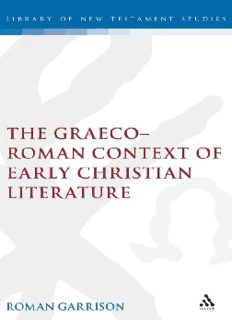
The Graeco-Roman context of early Christian literature PDF
Preview The Graeco-Roman context of early Christian literature
JOURNAL FOR THE STUDY OF THE NEW TESTAMENT SUPPLEMENT SERIES 137 Executive Editor Stanley E. Porter Editorial Board Richard Bauckham, David Catchpole, R. Alan Culpepper, Margaret Davies, James D.G. Dunn, Craig A. Evans, Stephen Fowl, Robert Fowler, Robert Jewett, Elizabeth Struthers Malbon Sheffield Academic Press This page intentionally left blank The Graeco-Roman Context of Early Christian Literature Roman Garrison Journal for the Study of the New Testament Supplement Series 137 While research and writing are fulfilling and rewarding, life itself is a joy because of Evann, Jessica, and John, to whom this work is dedicated. Copyright © 1997 Sheffield Academic Press Published by Sheffield Academic Press Ltd Mansion House 19KingfieldRoad Sheffield SI 1 9AS England Printed on acid-free paper in Great Britain by Bookcraft Ltd Midsomer Norton, Bath British Library Cataloguing in Publication Data A catalogue record for this book is available from the British Library ISBN 1-85075-646-5 CONTENTS Abbreviations 7 Chapter 1 THE GRAECO-ROMAN CONTEXT OF EARLY CHRISTIANITY 9 Introduction 9 The Negative View of Graeco-Roman Mythology 9 The Positive View of fcOther Voices' 14 One Man's Confusing View 19 The Hellenistic Background of Early Christianity 20 Some Intriguing Parallels 23 Chapter 2 APHRODITE AND 1 CORINTHIANS 27 Introduction 27 The Effects of the Aphrodite Traditions on Paul's Letter 35 Conclusion 39 Chapter 3 FRIEND OF TAX COLLECTORS 41 Introduction 41 The Symposium and the New Testament 43 Jesus and Table Fellowship 45 Chapter 4 LAST WORDS 48 Introduction 48 Luke's Sources 49 Luke's Last Words of Jesus 54 Conclusion 56 6 The Graeco-Roman Context of Early Christian Literature Chapter 5 PLUTARCH AND 1 CLEMENT 58 Introduction 58 The Purpose of 1 Clement 59 Plutarch's Praecepta Gerendae Reipublicae 61 Conclusion 64 Chapter 6 LEGIONS OF ANGELS AND THE WILL OF GOD 66 Introduction 66 Matthew and the 'Fate' of Jesus 70 Jesus, Achilles, Socrates, Ignatius, and 'Fate' 73 Chapter 7 THE LOVE OF MONEY IN POLYCARP'S LETTER TO THE PHILIPPIANS 74 Chapter 8 MISCONCEPTIONS OF THE KINGDOM OF GOD IN EARLY CHRISTIANITY 80 Introduction 80 Variant Appeals to the Sayings of Jesus 82 1 Corinthians 83 Other Early Christian Texts 89 Conclusion 94 Chapter 9 PAUL'S USE OF THE ATHLETE METAPHOR IN 1 CORINTHIANS 9 95 Introduction 95 Themes in Paul's Use of the Metaphor 97 Conclusion 103 Bibliography 105 Index of References 112 101 Index of Authors ABBREVIATIONS AB Anchor Bible CBQ Catholic Biblical Quarterly CP Classical Philology ETL Ephemerides theologicae lovanienses HTR. Harvard Theological Review Int. Interpretation JAAR. Journal of the American Academy of Religion JBL. Journal of Biblical Literature JSNT.Sup Journal for the Study of the New Testament, Supplement Series JTS. Journal of Theological Studies NovT. Novum Testamentum NTS. New Testament Studies PerR.S Perspectives in Religious Studies SR. Studies in Religion/Sciences religieuses TDN.T G. Kittel and G. Friedrich (eds.), Theological Dictionary of the New Testament ZNW. Zeitschriftfur die neutestamentliche Wissenschaft This page intentionally left blank Chapter 1 THE GRAECO-ROMAN CONTEXT OF EARLY CHRISTIANITY Introduction The church today battles with the corrosive acids of contemporary culture; yet the language and images of the day (or the hour) are often employed by the church in order to make the gospel message more 'understandable' to the members of that same contemporary culture. Consequently, a strange and strained relationship has developed between Christianity and modern Western society. This problem has an ancient history. The Negative View of Graeco-Roman Mythology Early Christianity firmly rejected Graeco-Roman traditions about the gods, and the contemporary society regarded the Christians as a threat to popular conventions derived from mythology. It is claimed that when he was brought out for execution and the herald announced, ' Poly carp has confessed that he is a Christian', the crowd of Gentiles and Jews (eOvoiv ie KCU 'Ioi)8aicov) cried out for his death, accusing him of being 'the destroyer of our gods' (6 icbv THuetepcov Geoov KdOaipetrn;).1 The historical accuracy of this report is not of central concern; rather our interest is drawn to the author's suggestion that Christianity was a danger both to the gods of the Graeco-Roman religions and even to the god of the Jews. Similiarly, in his apologetic letter to Diognetus, the writer praises his reader's interest: ...you are exceedingly zealous to learn the religion of the Christians and are asking very clear and careful questions concerning them... who is the god in whom they believe and how they worship him... [For the 1. Man. Pol. 12.1-2.
Description: